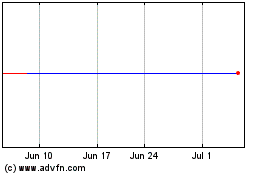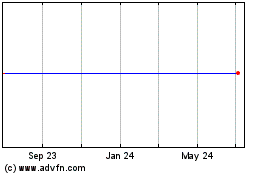By Dana Cimilluca, Don Clark and Dana Mattioli
Michael Dell is pressing ahead with partner Silver Lake on a $50
billion-plus acquisition of data-storage giant EMC Corp., people
familiar with the matter said, a bold but risky deal that would
require massive debt financing at a time when credit markets have
become less hospitable to mergers.
Negotiations have advanced and could produce an agreement by
next week, the people said. A merger of that size would be the
largest ever in the technology industry, and Dell and Silver Lake
are in talks to secure a debt package that could top $40 billion to
fund it, one of the people said.
The recent rebound in markets has added urgency to the talks.
Dell and its advisers have been grappling in recent days with how
to finance the takeover at a time when markets are volatile and
debt investors have balked at a number of recent takeover-related
offerings, another person said. They are eager to get the deal done
before credit tightens further, the person said, and the improved
climate has given them an opening.
The deal would mark an attempt by Mr. Dell to craft a future for
a company caught between the shift toward mobile devices such as
Apple Inc.'s iPhone and fierce competition among providers of
storage capacity and computing power. A merger in theory could
transform the PC and server specialist Mr. Dell took private two
years ago into a one-stop shop capable of serving a full range of
corporate computing needs.
A combined Dell-EMC would encompass computing, networking and
storage--both hardware and software--giving it the breadth to
compete more effectively with larger companies such as
International Business Machines Corp., Hewlett-Packard Co., Cisco
Systems Inc. and Oracle Corp.
"Dell and EMC would be a tech behemoth," said Daniel Ives, an
analyst at FBR Research. "It would change the landscape of
enterprise computing."
A deal wouldn't answer all of the questions facing Dell or EMC.
Some close watchers of the tech scene feel that finding ways to
unlock stock-market value may outweigh any potential business
benefits to the companies.
To cover the cost of a deal, closely held Dell and Silver Lake
may also need to come up with as much as $20 billion themselves,
which they would likely do in part by selling shares in EMC's
VMware Inc. unit, the people said.
VMware, which helped develop software that makes corporate data
centers more efficient, is seen as the crown jewel of the
transaction. EMC currently owns roughly 80% of VMware, which has a
market capitalization of about $32 billion. Dell would likely hold
on to a controlling stake after any sales, the people said.
A merger with EMC would help Dell exploit a trend toward selling
bundles of hardware components together, known as converged
infrastructure, which eases the need for companies to assemble and
test technology combinations themselves. EMC helped pioneer that
tactic in a joint venture with Cisco, which now supplies networking
and computing gear sold along with EMC storage gear.
An acquisition of EMC would also give the company's new owners a
chance to turn around its lackluster performance in recent years
outside the glare of public shareholders, much like Dell was. EMC
shares rose 4.7% on news of the possible deal Thursday to $27.18.
Still, the stock is up 37% in the past five years, versus a 76%
gain in the S&P 500.
Mr. Dell, who founded his company in his college dorm room in
1984, pioneered direct sales of computers based first on phone
calls and later the Web. The company later branched into servers,
the mainstay computers used to manage corporate operations, and
more recently acquired storage and networking businesses.
Both Dell and EMC rely heavily on sales of hardware for
corporate data centers, a business expected to gradually decline as
more operations are outsourced to cloud-computing services operated
by the likes of Amazon.com Inc., Google Inc. and Microsoft Corp.,
said Toni Sacconaghi, an analyst at Sanford C. Bernstein.
Spokesmen for Dell and EMC declined to comment on the deal
talks, first reported by The Wall Street Journal on Wednesday.
This has been a banner year for takeovers, one that has been
characterized by megadeals like Dell-EMC. There have been nearly
$3.4 trillion of mergers and acquisitions struck world-wide so far
this year, according to Dealogic, putting 2015 on pace to possibly
be the best year ever for deal making.
Should credit investors willingly fund an EMC takeover, it would
bode well for other deals and could be a sign that the surge in
M&A will continue.
Dell and Silver Lake, which helped take the PC and server maker
private in a $25 billion leveraged buyout in 2013, have assembled a
group of lenders including J.P. Morgan Chase & Co., Bank of
America Corp. and Credit Suisse Group to help them secure the debt
portion of the deal, the people said. The banks would provide a
bridge loan that could later be replaced by investment-grade bonds
and syndicated loans, one of the people said.
Following record or near-record debt issuance in recent years
that supported the M&A surge, credit investors have lately
become more fickle. In late September, J.P. Morgan cut a planned
high-yield bond sale backing Altice NV's purchase of Cablevision
Systems Corp. by $1.5 billion, making up the difference by selling
more debt in the loan market. Leveraged loans are viewed as safer
than bonds because they are secured by corporate assets. More
recently, Goldman Sachs Group Inc. and J.P. Morgan struggled to
sell $1.2 billion of loans backing the leveraged buyout of online
clothing retailer FullBeauty Brands, investors said this week.
One thing working in Dell's favor as it seeks to cobble together
the outsize debt package is EMC's relatively limited debt load and
its investment-grade credit rating. The Hopkinton, Mass., company,
had just $7.4 billion of debt and $7.7 billion of cash at the end
of June. Dell, meanwhile, had $11.7 billion in debt as of
mid-September, according to FactSet, and is junk-rated from both
Standard & Poor's and Moody's Investors Service.
Mr. Dell and Egon Durban of Silver Lake are likely to sell as
much as $10 billion of shares in VMware, which could leave them
with just over 50% of the software provider; roll over their
combined stake in Dell and between them and possibly others come up
with another roughly $5 billion of cash, one of the people
said.
The talks come at a delicate moment for Dell. A trial concludes
Thursday in a Delaware court over whether Mr. Dell and Silver Lake
paid a fair price when they took the company private. Former
stockholders with claim to about 37 million shares have argued the
company was worth roughly double the $13.75-a-share buyout price--a
figure Dell rejects, citing headwinds facing its PC business and
the risks surrounding its shift toward more-profitable areas.
At the high end, the difference amounts to more than $500
million, although a dispute over whether certain shareholders are
eligible could reduce that. If Dell is forced to make a large
payment, it could make its efforts to pay for EMC that much more
difficult.
Shira Ovide and Liz Hoffman contributed to this article.
Subscribe to WSJ: http://online.wsj.com?mod=djnwires
(END) Dow Jones Newswires
October 08, 2015 20:18 ET (00:18 GMT)
Copyright (c) 2015 Dow Jones & Company, Inc.
Global X Funds (NYSE:EMC)
Historical Stock Chart
From Mar 2024 to Apr 2024

Global X Funds (NYSE:EMC)
Historical Stock Chart
From Apr 2023 to Apr 2024
